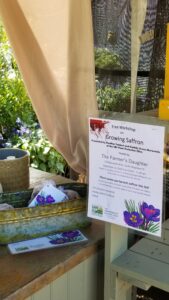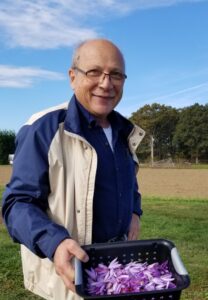Final report for SNE20-012-RI
Project Information
Problem and Justification: Rhode Island farmers are always looking for new crops to diversify their farming operations. A University of Rhode Island researcher, Dr. Fari Gheshm, in the Plant Sciences Department researched saffron production at URI's Agronomy Farm from 2017-2022 when he passed away. After twelve years of growing saffron in Iran and four years of saffron production in Rhode Island, he partnered with us to teach farmers and agricultural service providers (ASPs) about growing, harvesting, processing, and marketing saffron. Saffron is the most expensive spice in the world and could fit into the cropping cycle of many existing vegetable farms in RI. Small acreage is needed to grow saffron, so saffron could easily be grown on urban farms. Much interest has been generated by farmers and the general public about growing saffron in Rhode Island. Rhode Island farmers were introduced to growing saffron in 2020 with this project and, ASPs were trained to assist in their efforts.
Solution and Approach: Dr. Gheshm had science-based knowledge that needed extending into the farming community. That's what Extension is all about. Fifteen Ag Service Providers and Five farmers learned how to grow, harvest, process, and market saffron in Rhode Island by attending 2 workshops, webinars, and visiting saffron fields at URI and commercial farms in RI. We also produced 4 SHORT videos which have been viewed 521 times to educate the public about these topics (See Information Products section of this report). As a result of attending our educational programs, 25 people planted saffron, 63% of them were able to harvest flowers in the 2 years of this project, and 58% of them encouraged others to grow saffron! These are promising results, though on-farm saffron production was not the solution we recommend in this project.
In summary, three Agricultural Service Providers agree with me that growing, harvesting, processing, and selling saffron in Rhode Island is not economically feasible because it is too labor intensive. What may be feasible is to produce saffron corms which could be sold at a premium at local garden centers and farmers markets. Another possible model for making money from saffron is Pick-Your-Own saffron. One RI grower tried this at a limited scale and was successful. A third possible farming endeavor is to make saffron honey. A local beekeeper could bring bees into saffron fields for the few weeks that saffron flowers in October. One last method of saffron production which has shown promise is farmers and nursery producers growing saffron corms for sale to backyard growers. We piloted this in 2023 with 1,000 corms distributed (20 per bag) to three local farms. Two of these three farms hosted our How to Grow saffron workshops. One farm, which hosted a workshop, charged $12 per bag of 20 corms and displayed the saffron corms with information about the workshop at a prominent location in the garden center. In four weeks this farm sold approximately 75 bags of corms and could have sold more. The second farm, where we also held a workshop, had an attractive display, but the corms and advertisement for the workshop were not placed at a prominent location in the farm stand. This farm sold 12 bags of corms for $10 per bag. More than half of the 12 bags sold at this farm stand were sold at the end of the workshop. The second farm is smaller than the first farm with fewer customers, but perhaps a better display location could have improved sales. The third farm sold 12 bags of saffron within a few weeks. This farm did not host a workshop and we weren't able to provide additional corms to sell. The corms at the third farm were placed adjacent to the cash register.
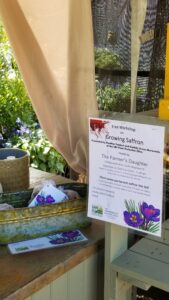
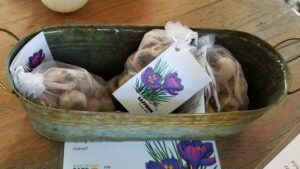
Six Agricultural Service providers will educate 25 growers in production practices, harvesting, processing, and selling saffron locally.
Need:
Many RI farmers are interested in crop diversification to manage risk. Rhode Island's climate is well suited for producing saffron, the world's most expensive spice. Saffron sells wholesale for $5000 per pound and retail for $11,000 per pound. The US imports 37 tons of saffron per year, mostly from the Middle East, and the Northeast US is a major market for saffron. More than 100 Vermont growers have been growing saffron over the last several years, and more growers are experimenting with saffron each year. Vermont growers easily sell their saffron at farmers markets and farm stands. Rhode Islanders are expected to embrace locally produced saffron too.
A researcher, Dr. Gheshm, at the University of Rhode Island, had 16 years of experience growing saffron in Iran and RI. Through his on-farm research plots, he shared his knowledge with farmers and agricultural service providers in RI through this project. Farmers and agricultural service providers first became introduced to producing saffron in RI at a 2018 URI vegetable twilight meeting with 35 growers in attendance, a 2019 article in the Providence Journal, and a 2019 Plant Pro segment on local television news that reaches 10,000 viewers. There was also an article in the Spring 2020 edition of the URI Alumni Magazine about saffron research at URI.
This outreach generated interest in saffron production statewide. New saffron growers need technical assistance from agricultural service providers to grow this unique crop. Before this project, no Rhode Island agricultural service providers knew how to grow, harvest, process, or market saffron.
Growing saffron is very different than growing most crops. Corms are planted in the summer, flower stigmas are harvested October to November, leaves continue growing until June, then plants are dormant through the summer until October. Plants are perennial and flowers can be harvested for up to six seasons. Growing saffron is much different than introducing a new type of vegetable or fruit to a farming operation.
Solution and Approach:
Through this project, fifteen Ag Service Providers and five farmers learned how to grow, harvest, process, and market saffron in Rhode Island by attending 2 workshops, webinars, and visiting saffron fields at URI and commercial farms in RI. We also produced 4 SHORT videos which have been viewed 521 times to educate the public about these topics (See Information Products section of this report). As a result of attending our educational programs, 25 people planted saffron, 63% of them were able to harvest flowers in the 2 years of this project, and 58% of them encouraged others to grow saffron!
Year one of the project focused on growing saffron; year two focused on harvesting and processing; and year three focused on marketing saffron. A potential barrier to saffron production in Rhode Island is the intense need for labor during four crucial weeks in late October into November. Saffron flowers need to be harvested daily for 3-4 weeks and stigmas must be separated from flowers within 48 hours of harvesting. We made farmers aware of this intense labor need and demonstrated that growing saffron can fit into their field production cycle.
Due to high labor needs of saffron, our final recommendation is that farmers in RI grow corms for sale to backyard producers, establish pick-your own, or even make a unique saffron honey.
Advisors/Cooperators
- - Technical Advisor (Educator and Researcher)
- (Educator)
- - Producer
Educational approach
Recruitment
Saffron is a very different crop than other vegetables and herbs currently grown in Rhode Island. Perennial saffron corms are planted in August, bloom October to November when stigmas are harvested, and continue growing leaves through the winter and into June when corms enter dormancy. Saffron fields can remain in production for up to six years. Since saffron is a new crop for Rhode Island ASP do not know how to grow saffron.
Agricultural Service Providers will be recruited from URI Cooperative Extension, RI USDA Farm Service Agency, and the non-profit organization Southside Community Landtrust. Farmers and ASP will hear about saffron production at the yearly Vegetable Twilight Meeting at URI's Agronomy Farm in September 2020, usually attended by 35 farmers and ASP. Agricultural Service Providers will also be recruited to participate in the project through workshop/conference promotional emails. Promotional emails will be followed up by personal phone calls or in person conversations, inviting ASP to the workshops and conference. Participating ASP will also be invited to visit the saffron plots at the URI Agronomy Farm. One Rhode Island farmer plans to plant saffron corms in 2020. Agricultural Service Providers will be invited to visit this commercial saffron field at various times during the three year project and also to any other farm that starts growing saffron in RI. A cohort of ASP are expected to participate for the entire project.
Education
Through this three year saffron project, ASP will participate in yearly farmer trainings provided by URI, accompany URI Extension workers to URI's saffron fields, and visit at least one commercial saffron grower's farm. Agricultural Service Providers will increase their knowledge on growing, harvesting, processing, and marketing saffron locally. With this new knowledge, ASP will be able offer technical assistance to RI saffron growers, or know where to turn to obtain proper technical assistance. Saffron is a new crop for Rhode Island, and ASP will need to be able to answer questions posed to them by established farmers, urban farmers, and beginning farmers.
During year one, a half-day classroom workshop will include an overview of saffron harvesting, processing, and marketing saffron, and focus primarily on growing saffron. Dr. Gheshm, from URI, has been conducting field research on saffron, exploring the use of low tunnels and corm planting densities. Dr. Gheshm will share his experience and research with farmers and ASP about various growing techniques at the Year 1 workshop. Attendees will be given a new fact sheet on growing saffron written for this SARE project. Workshop attendees will be encouraged to visit the URI saffron plot informally and as part of the yearly September URI twilight meeting.
The second year of the project will also be a half-day classroom workshop focusing on harvesting and processing of saffron. Dr. Gheshm has been harvesting and processing saffron from his URI saffron field and will be the main speaker at the Year 2 workshop. At this workshop, harvesting and processing will be thoroughly covered along with an update on growing techniques. A second fact sheet on harvesting and processing saffron will be given to workshop attendees, and the fact sheets from year 1 and year 2 will be available on the URI Cooperative Extension website. Workshop attendees will be encouraged to visit the URI saffron plot informally and as part of the yearly September URI twilight meeting. By year 2, there should be at least one RI farmer growing saffron. Agricultural Service Providers will be invited to accompany Heather Faubert and Dr. Gheshm to the commercial saffron field.
The third year of the project will culminate in an all-day conference held at URI or a nearby facility. A major focus of this conference will be marketing locally grown saffron. Local chefs and retailers will be invited to the conference along with farmers and ASP. Growing, harvesting, and processing will also be covered during the conference. Experts from the University of Vermont's North American Center for Saffron Research and Development have agreed to speak at URI's saffron conference. A third fact sheet on marketing saffron will be available at the conference and on the URI Cooperative Extension website.
An educational video will also be produced and housed on the URI website. This will be filmed by Heather Faubert and edited by experienced URI students.
Verification
Following each workshop and conference, attendees will be surveyed immediately after and 6 months later to learn whether or not they have planted saffron, if they intend to plant saffron, how many corms have been planted, amount of saffron harvested and processed, and number of farmers assisted by ASP about saffron production. If insufficient information is collected via survey, ASP will be contacted by phone or email. Survey questions will also inquire about the need for additional saffron information not covered so far in trainings.
Depending on survey responses, topics covered during future workshops and the conference will be reconsidered and appropriate changes made.
The number of times URI saffron fact sheets are downloaded and the number of times the URI saffron video is viewed will be reported.
Milestones
450 Ag Service Providers and farmers will receive notification about half-day workshop about growing saffron in Rhode Island.
435
15
1988
9
March 31, 2021
Completed
March 02, 2021
Ag Service Providers, farmers, and gardeners were invited to participate in the March 2nd webinar. Personal emails were sent to 9 RI Ag Service Providers and 20 people who had contacted URI in the past 2 years about growing saffron. Information about the webinar was advertised on Extension Educator, Andy Radin's newsletter (circulation of 620) and also the RI DEM Produce Safety newsletter (circulation 269). It was also mentioned to members of the Saffronnet listserve, which reached 700 people interested in growing saffron in New England and throughout the US. Five days before the event it was advertised to URI Master Gardeners and other people on the Cooperative Extension email list. After the event was over, a video of the webinar was available on You Tube.
Ag Service Providers and farmers will gain knowledge on growing saffron in Rhode Island at a half-day workshop held at the University of Rhode Island. New factsheet on producing saffron will be available at this workshop.
25
6
92
8
June 30, 2021
Completed
June 30, 2021
Due to the pandemic, we held a virtual workshop on growing saffron on March 2, 2021. Registration page: https://events.uri.edu/event/webinar_-_growing_saffron_in_rhode_island#.YCrXAuhKhPY
A recording of the webinar can be viewed at https://www.youtube.com/watch?v=mXLF2-A6FGA&list=PLXL0ba4UPZKJFiKo0E6QoHkXnik-rfT0L&index=1&t=9s
As of November 22, 2021, the recorded saffron webinar was viewed 757 times since being posted in early March, 2021.
A fact sheet on growing saffron was written in January, 2021 and available at https://drive.google.com/file/d/1mCVjIXpsoujplr_pRvIHzEdt2InkYs7X/view
Workshop attendees will be surveyed at the completion of the workshop and again 6 months later. Survey questions will include number of farmers each Ag Service Provider assisted with saffron production, number of farmers that have planted saffron, and number of corms planted.
8
6
34
8
December 31, 2021
Completed
November 23, 2021
An 8 month follow-up survey was sent to 163 recipients which included those that registered for the March 2, 2021 webinar plus others that had contacted me and watched the recorded webinar video at a different time. Results from the survey indicate 8 agricultural service providers communicated with 37 farmers about growing saffron in Rhode Island.
Saffron corms were planted at 16 locations in Rhode Island in 2021 compared to 6 locations in 2020. In 2021, most people planted planted 1-50 corms (12 responders), while 4 people planted 51-1000 corms, and 2 farmers planted over 1000 corms.
Ag Service Providers will visit the URI saffron field at the University of Rhode Island at least once over the year.
5
4
16
5
December 31, 2021
Completed
November 23, 2021
We held a saffron corm give-away and informal training session on September 23, 2021 at the URI Skogley Turf Research Center.
We also started an email group for Rhode Island saffron growers wishing to communicate regularly about saffron production at URI and their own plantings. Twenty-three people signed up for the saffron email group including 5 Agriculture Service Providers. Heather Faubert initiated or responded to 12 posts, Fari Greshm responded to or initiated 15 posts, and there was a total of 114 emails exchanged from September 30 to November 23.
Ag Service Providers and farmers will receive notification about 2nd saffron workshop at the University of Rhode Island. This workshop will focus on harvesting and processing saffron and will update participants on saffron growing techniques.
435
15
3
March 31, 2022
Completed
February 22, 2022
A webinar on saffron production, harvesting and processing was advertised to Master Gardener Volunteers and URI Ag Service Providers. On February 22nd, 140 attendees learned about saffron and what a wonderful crop it is for backyard growers. The webinar was recorded and posted on the URI Cooperative Extension YouTube channel at https://www.youtube.com/watch?v=lgZBb5dkaiA
Ag Service Providers and farmers will gain knowledge about harvesting and processing saffron at a half-day workshop at the University of Rhode Island. Second fact sheet on harvesting and processing saffron, plus the production fact sheet produced in year 1, will be available at the workshop.
25
6
3
7
June 30, 2022
Completed
September 16, 2022
We held two in person saffron planting workshops in September. Participants learned about proper soil and planting techniques for saffron production. One grower in Rhode Island plans to plant 11,000 saffron corms on 1/4 acre in September, 2022.
Several videos on saffron production are being developed and be posted on the URI Cooperative Extension YouTube channel. Short videos are being made about planting saffron, weeding saffron plots, fertilizing saffron plots, harvesting saffron and processing saffron.
Workshop attendees will be surveyed at the completion of the workshop and again 6 months later. Survey questions will include number of farmers each Ag Service Provider assisted with saffron production, number of farmers that have planted saffron, number of corms planted, amount of saffron harvested and processed.
15
6
7
December 31, 2022
Completed
November 29, 2022
Previous workshop attendees were surveyed via Google Forms in November, 2022. Surveys were sent to 95 participants and responses were received from 12 participants.
Of the people that responded, 66.7% planted saffron corms in 2022, and most of these growers planted 26-100 corms, though two growers planted over 1000 corms. Planting fewer than 1000 corms indicates the planting is for personal production, while planting more than 1000 corms indicates growing saffron commercially.
Of the 12 survey responses, five were from Agricultural Service Providers. Of these five Ag Service Providers, four advised one or two saffron growers, while one of the surveyed Ag Service Providers advised 3 - 6 saffron growers.
Ag Service Providers will visit the saffron field at the University of Rhode Island or a commercial saffron field at least once over the year.
8
6
3
8
December 31, 2022
Completed
November 15, 2022
Seven URI Agricultural Service Providers and one USDA Farm Service Agency employees visited URI's saffron plots to see saffron being planted, cared for, harvested, processed or dried. Two farmers that are serious about getting into commercial saffron production visited URI's saffron plots to learn about our rodent fencing, planting techniques and harvesting techniques.
Ag Service Providers and farmers will receive notification about day-long saffron conference at the University of Rhode Island or nearby venue. Conference will cover saffron production, harvest, processing, and marketing.
435
15
300
7
March 31, 2023
Completed
September 11, 2023
I decided in the winter of 2023 that the focus of this SARE saffron project had to change. Saffron is a wonderful crop for backyard or hobbyist growers, and not very practical for commercial farms to grow and produce saffron spice. It is much more practical for commercial farms to produce and sell saffron corms and allow backyard growers to grow their own saffron. I decided that what RI agriculture needs is a bigger demand for homegrown saffron by gardeners. Hopefully, in the future, saffron corms can be produced by local growers and sold for a premium at garden centers and farmers markets.
With this new focus, 1000 saffron corms were ordered from Roco Saffron in the Netherlands. The corms arrived August 7, and we packaged corms into decorative mesh bags, 20 corms per bag. Basic growing instructions were attached to each bag and distributed to two farms with retail garden centers, one in southern RI and one in northern RI.
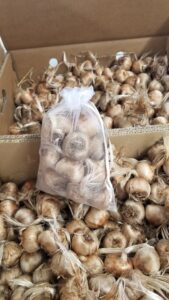
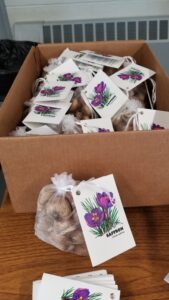
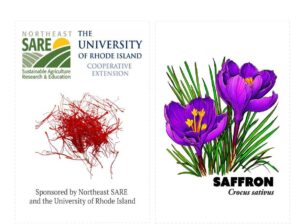
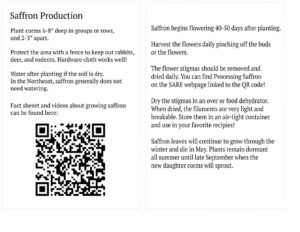
The two RI farm garden centers agreed to host a workshop on growing saffron. The workshop participants learned about the workshops either by seeing the advertising poster at the garden centers or through the farms' social media efforts.
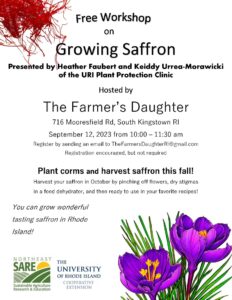

Ag Service Providers and farmers will attend all-day conference and will gain knowledge on producing, harvest, processing, and marketing saffron. The third fact sheet on marketing saffron will be available at the conference, as well as the two previously produced fact sheets.
300
6
42
4
June 30, 2023
Completed
September 12, 2023
In September, 2023, saffron growing workshops were held at two Rhode Island farms with garden centers. Workshop participants were primarily Master Gardeners, gardening club members, or other gardening enthusiasts. Topics covered during the workshop included what is Northeast SARE, planting saffron corms, harvesting and drying saffron. The workshop participants were enthusiastic about growing saffron! And the farmers were happy to host the workshops and learn about saffron.
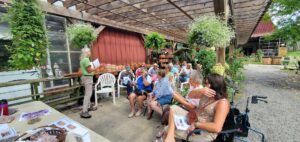
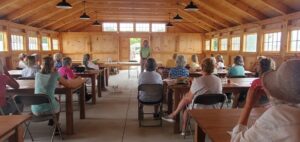
Initially a third farm with a garden center was contacted about hosting a saffron workshop, but for various reasons this workshop didn't occur.
The original Milestone was the following: Conference attendees will be surveyed at the completion of the conference and again 3 months later. Survey questions will include number of farmers each Ag Service Provider assisted with saffron production, number of farmers that have planted saffron, number of corms planted, amount of saffron harvested and processed, and where saffron has been sold or planned to be sold. Saffron video made during the 3 year project will be available on the URI YouTube website in time for the 3 month followup survey.
Because of the focus change in 2023, project participants were surveyed about their interest in growing saffron and their interest in promoting growing saffron. Surveys were emailed to 135 participants in the fall of 2023. Survey results are in the Accomplishment section below.
25
6
28
3
September 30, 2023
Completed
September 12, 2023
A survey was emailed to 135 people connected to URI's SARE saffron project. Twenty-eight people responded to the survey. Here are the survey results:
1. Did you attend a saffron workshop in person or online that was taught by someone from the University of Rhode Island?
No - 3
2021 - 8
2022 - 4
2023 - 15
2. Have you planted saffron corms between 2021 and 2023?
No - 3 (11.1%)
Yes - 25 (89.3%
3. Were you able to harvest saffron flowers?
No - 10 (37%)
Yes - 17 (63%)
4. If you are growing saffron, do you intend to continue growing saffron?
No - 4 (15.4%)
Maybe - 8 (30.8%)
Yes - 14 (53.8%)
5. Have you encouraged other people to grow saffron?
No - 11 (44%)
Yes - 15 (57.7%)
6. If you have encouraged others to grow saffron, about how many people have you encouraged to grow saffron?
Encouraged 1 person - 4 (25%)
Encouraged 2-5 - 11 (68.8%)
Encouraged 5-10 - 0
Encouraged >10 - 1 (6.2%)
7. Anything else you want say about your saffron growing experience?
Many survey responders wrote comments and a few are listed here:
* I had great success using an unused recycling container. All the bulbs produced flowers and I got saffron from all of them.
* Thin leaves have emerged but no flowers.
* The wildlife prohibits planting - rabbits, ground hogs, and deer - Glad I only experimented with a few corms!
* It is very rewarding esp. if you like to cook with saffron. Pretty easy to grow. Def need to use hardware cloth / screening.
* It is very interesting, and I am very glad that I know about it now.
* It's been a complete mystery!
* I thought the voles ate all the corms but a few survived!
* About half of what I planted is growing.
* I harvested saffron from 2 small patches in 2022 and greens emerged in 2023, but the plants disappeared.
* I thoroughly enjoyed the workshop and the presenter. It was a unique experience. As a matter of fact I was able to use the saffron last night with our dinner--saffron and brown rice.
* May I use the picture of your crocus and place it in our North Stonington Garden Club Newsletter...with some information?
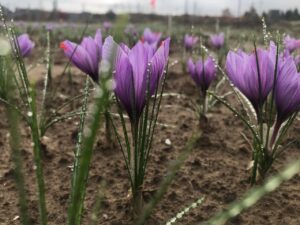
Ag Service Providers will visit the saffron field at the University of Rhode Island or a commercial saffron field at least once by the end of the project.
10
2
5
8
September 30, 2023
Completed
September 30, 2023
Agricultural service providers and gardeners/farmers like to visit the URI saffron plots during harvest. Over the three week harvest 13 people visited the saffron. We showed the visitors how to harvest the flowers then separate the stigmas from the flowers. We discussed drying and storing the saffron.
Milestone activities and participation summary
Participation summary:
Learning Outcomes
Three Agricultural Service Providers agree with me that growing, harvesting, processing, and selling saffron in Rhode Island is not economically feasible because it is too labor intensive. What may be feasible is to produce saffron corms which could be sold at a premium at local garden centers and farmers markets. Another possible model for making money from saffron is Pick-Your-Own saffron. One grower tried this at a limited scale and was successful. A third possible farming endeavor is to make saffron honey. A local beekeeper could bring bees into saffron fields for the few weeks that saffron flowers in October. This information was collected through personal conversations with Ag Service Providers and one farmer growing saffron in Rhode Island.
Performance Target Outcomes
Performance Target Outcomes - Service Providers
Target #1
Six Agricultural Service providers will educate 25 growers in production practices, harvesting, processing, and selling saffron locally.
12 acre
| Year 1 | Year 2 | Year 3 |
|---|---|---|
| 8 | 5 | 3 |
Discussed growing saffron with farmers in Rhode Island.
URI's main saffron plot did poorly over the winter of 2022. A new member of URI Cooperative Extension working in the URI Plant Protection Clinic analyzed saffron plants and corms and concluded that the problem was excessive water and compaction, rather than a disease organism. This knowledge helped with URI's saffron production and with advising local growers about saffron production.
| Year 1 | Year 2 | Year 3 |
|---|---|---|
| 37 | 12 | 1 |
| Year 1 | Year 2 | Year 3 |
|---|---|---|
12 acres |
10 acres |
| Activity | Year 1 | Year 2 | Year 3 | Total |
|---|---|---|---|---|
| Curricula, factsheets and other educational tools | 0 | 3 | 1 | 4 |
| Consultations | 37 | 14 | 2 | 53 |
In November 2021, a survey was sent to all workshop participants and those who contacted us before or after viewing the webinar online on their own. The survey was sent to 163 people and 42 responded. Of these 42 responders, 8 indicated that they advise farmers. According to the survey responses, these 8 agriculture service providers discussed growing saffron with 37 growers or potential growers.
In November 2022, a Google Forms survey was emailed to everyone on URI's Saffron list of 95 people, 7 of which are Agriculture Service Providers. Of these 95, 12 people responded to the survey, including all 7 Ag Service Providers. The 7 Agriculture Service Providers talked to 12 people about growing saffron.
Through the summer and fall of 2023, I talked to interested service providers about saffron production in Rhode Island. We all agree that growing saffron spice here is not economically feasible. It may be feasible to produce saffron corms for local sale. Currently, saffron corms planted in the US are shipped from the Netherlands. There is a growing market for locally produced saffron corms. Producing corms for gardeners is probably the most profitable way of making money from growing saffron. Producing saffron corms rather than saffron spice would eliminate the labor intensity of harvesting, processing, and drying saffron flowers and stigmas.
In the fall of 2023 a survey was sent to 135 people that I've communicated with about growing saffron in RI over the tree years of this project. The survey asked if they are growing saffron, if they will continue to grow saffron, and if they have encouraged others to grow saffron. The purpose of the survey was to measure their interest in growing saffron so that hopefully they, or their friends, could support local saffron corm production.
Performance Target Outcomes - Farmers
Target #1
1
One Rhode Island cut flower grower planted 10,000 saffron corms, hoping to be able to sell saffron at farmers markets. He now plans to change his farming model to produce saffron flowers for Pick-Your-Own saffron and to harvest corms to be sold at farmers markets.
10 acre farm with .5 acres of saffron
1
The one saffron farmer in Rhode Island has done a limited amount of Pick-Your-Own saffron and will increase this practice in the future. In 2024 he plans to harvest corms to be packaged and sold at farmers markets.
10 acres
In 2022, one Rhode Island cut flower grower planted 10,000 saffron corms, hoping to be able to sell saffron at farmers markets. He learned that due to the intense need for labor over a short period of time, it is not feasible to harvest saffron for spice production. In 2023 he decided to change his farming model to produce saffron flowers for Pick-Your-Own saffron, and to harvest corms to be sold at farmers markets. I have had many discussions with this grower over the past two years with regards to him growing saffron. Personal communication has been the verification method.
Additional Project Outcomes
| Year 1 | Year 2 | Year 3 | Total |
|---|---|---|---|
| 0 | 1 | 0 | 1 |
| Year 1 | Year 2 | Year 3 | Total |
|---|---|---|---|
| 0 | 0 | 0 | 2 |
Our friend, colleague, and inspiration for growing saffron, Fari Gheshm, died on April 19, 2022 after a short battle with cancer. We owe our love and knowledge of saffron to him. I hear his guiding voice every day as I work on this SARE Saffron Project. We miss his gentle soul.
2023 update. We never would have grown saffron in Rhode Island without Fari's encouragement. I think of him fondly nearly daily. Even though I ended up disagreeing with Fari and the possibility of growing saffron spice commercially, I think Rhode Island farmers can make money from growing saffron corms and selling them at retail prices at garden centers and farmers markets. We demonstrated how easily saffron corms could be sold when the corms are packaged attractively. One garden center sold over 70 bags of saffron corms within a couple of weeks at $12 per bag of 20 corms, and they could have sold many more. There is a lot of interest in 'growing your own' and saffron growing is a terrific addition to gardening. The spice is expensive and exotic, and it grows when there are fewer demands in the garden. I love my saffron patch at home!



SARE Outreach
The RI Professional Development Program (PDP) State Coordinator will promote SARE grant programs (Farmer Grants, Graduate Student Grants, Partnership Grants,Research and Education Grants, Research and Novel Approaches Grants, and Professional Development Grants) and SARE educational materials at every opportunity.
SARE programs will be promoted at all events sponsored by SARE RI or tri-state PDP grants by including the SARE logo on all printed materials and explicitly crediting SARE with funding the experience.
SARE granting opportunities will be advertised to RI farmers and researchers through the RI Ag Notes email list of 519 members.
SARE granting opportunities and information clearinghouse on the SARE website will be promoted at all in person twilight meetings and workshops at URI and local farms.
